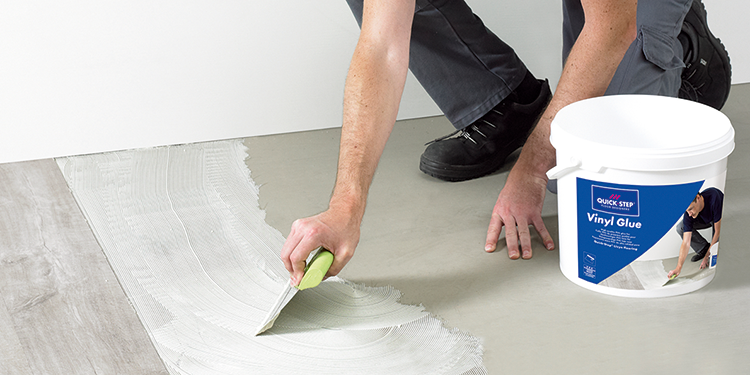Imagine walking into your brand-new kitchen, the air fresh, the cabinets gleaming, and the floor… a disaster. The vinyl sheet flooring you painstakingly installed is buckling, curling, and tripping you up. You thought you did everything right, but now you’re staring at a nightmare of uneven, potentially hazardous flooring. This is what can happen when you skip the glue. But do you *always* need to glue down vinyl sheet flooring? The answer is not as straightforward as you might think.

Image: designedflooring.art
Vinyl sheet flooring, often referred to as “sheet vinyl” or “vinyl tile,” has become a popular choice for homeowners seeking durable, affordable, and stylish flooring. But the question of whether to glue it down remains a point of confusion. This comprehensive guide will delve into the intricacies of gluing down vinyl sheet flooring, exploring when it’s necessary, when it’s optional, and the factors to consider for a successful installation.
Understanding Vinyl Sheet Flooring: A Modern Flooring Solution
Vinyl sheet flooring has evolved from simple, utilitarian coverings to sophisticated designs mimicking natural materials like wood, stone, and tile. It’s a versatile option for various areas in your home, including kitchens, bathrooms, basements, and even living rooms.
Vinyl sheet flooring’s durability is one of its main attractions. It stands up well to heavy foot traffic, resists stains, and is easy to clean. This makes it a practical choice for families with children and pets. Additionally, vinyl sheet flooring can be an excellent option for those with allergies as it’s naturally resistant to dust mites and mold. And for those concerned about their environmental footprint, many brands now offer eco-friendly vinyl sheet flooring made from recycled materials.
The Glue Dilemma: When is Glue Necessary?
So, when do you need to glue down vinyl sheet flooring? The answer primarily depends on the type of vinyl you choose and the subfloor conditions. Here are the scenarios where gluing is usually essential.
1. Loose Lay Vinyl Sheet Flooring
Loose lay vinyl sheet flooring, as the name suggests, is designed to be installed without adhesive, relying on its weight for stability. While this type of vinyl can be a good option for temporary installations or rooms with uneven subfloors, it does have some limitations.
Loose lay vinyl flooring tends to be thicker than glued-down vinyl, potentially affecting the overall thickness of your flooring. Additionally, loose lay vinyl can shift or move, creating a safety hazard and affecting its lifespan.

Image: viewfloor.co
2. Subfloor Irregularities
Even with self-adhesive options, your subfloor should be smooth and level for the best results. If your subfloor has significant unevenness, bumps, or dips, gluing down the vinyl sheet flooring is a necessity.
This is because glue helps to create a secure, even bond between the flooring and the subfloor, preventing movement and gaps that can trap dirt and moisture. Gluing also enhances the vinyl sheet flooring’s durability against heavy foot traffic, furniture movement, and even pets.
3. High Traffic Areas
High-traffic areas, such as kitchens, hallways, and entryways, experience a lot of foot traffic, potentially leading to premature wear and tear on the vinyl sheet flooring. Gluing down the vinyl in these areas adds a layer of protection, ensuring it stays firmly in place and resisting movement and potential buckling.
When It’s Optional: Considerations for Un-Gluing
Now, let’s discuss situations where you might consider skipping the glue:
1. Self-Adhesive Vinyl Sheet Flooring
Self-adhesive vinyl sheet flooring features a peel-and-stick backing, eliminating the need for separate adhesive. The adhesive is pre-applied to the back of the flooring, making installation quick and easy. However, it’s important to note that self-adhesive vinyl flooring typically works best on smooth and level surfaces.
2. Low Traffic Areas
In rooms with less foot traffic, such as bedrooms or spare rooms, choosing not to glue down your vinyl sheet flooring might be an option. However, remember that even in low-traffic areas, your subfloor should be smooth and level.
3. Room Dimensions and Subfloor Condition
The size of your room can also influence your decision. In larger rooms, especially with subfloors that aren’t perfectly smooth, gluing down the vinyl sheet flooring might be more prudent to prevent buckling and movement over time. Smaller rooms might be more suitable for un-glued installations.
Choosing the Right Adhesive: A Vital Choice
If you decide to glue down your vinyl sheet flooring, selecting the right adhesive is crucial. There are several types of adhesives available, and the best one will depend on your specific needs and the type of vinyl sheet flooring you’ve chosen. Consult with a flooring specialist to determine the best adhesive for your unique project.
When choosing an adhesive, consider the following factors:
Do-It-Yourself vs. Professional Installation
Installing vinyl sheet flooring can be a DIY project, especially with the availability of self-adhesive options. However, for a professional-looking, long-lasting installation, especially with glue-down options, seeking professional help might be the wiser choice. Professional installers have the experience and skills to ensure your flooring is properly installed, minimizing potential issues and maximizing its lifespan.
Do You Have To Glue Down Vinyl Sheet Flooring
Conclusion
The decision of whether to glue down vinyl sheet flooring isn’t a one-size-fits-all proposition. It’s a decision that requires careful consideration of factors such as the type of vinyl you choose, the condition of your subfloor, the amount of expected foot traffic, and your personal preference. Always remember, the goal is to achieve a durable, aesthetically pleasing, and safe flooring installation that you’ll enjoy for years to come.
If you’re still unsure, never hesitate to consult with a flooring professional or a trusted contractor. They can provide expert advice tailored to your specific needs and project, ensuring you make the best decision for your home. Don’t let your dream flooring become a source of frustration. Choose wisely, and enjoy the beauty and functionality of your new vinyl sheet flooring for many years to come.



/GettyImages-173599369-58ad68f83df78c345b829dfc.jpg?w=740&resize=740,414&ssl=1)


